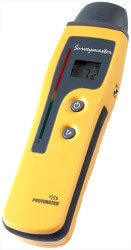While having lunch during a recent all-day continuing ed seminar for home inspectors, we home inspectors all did what home inspectors do when they get together; we talked about home inspections. We’re out inspecting houses with new clients every day, our wives are tired of hearing about home inspection ‘stuff’, and we get very little peer interaction unless we participate in online discussion forums.
 So anyways, we’re talking about home inspection tools. Oh boy, can we talk about tools. I asked one of the guys at my table, a relatively new inspector, about what type of moisture meter he uses. His answer drove me nuts.
So anyways, we’re talking about home inspection tools. Oh boy, can we talk about tools. I asked one of the guys at my table, a relatively new inspector, about what type of moisture meter he uses. His answer drove me nuts.
“I don’t use a moisture meter, because I’ve heard other home inspectors say that this only increases your liability.”
I’ve heard this repeated by nail-biting home inspectors countless times over the years. I knew exactly what he had heard, but I encouraged him to elaborate.
“If you use a moisture meter to investigate one area but don’t use a moisture meter on every wall surface and you end up missing something, you could be held liable for negligence. A prosecutor would say that because you used a moisture meter in one place, you should have used it everywhere.”
Sorry, but I don’t buy into that. He was given weak advice from a home inspector who spends more time worrying about getting sued than they spend trying to identify problems with a house.
If a home inspector wants to provide a great service to their clients, get referrals, stay busy, and be proud of their work, here’s some stuff they ought to do:
- Ask questions
- Embrace new technology
- Buy the latest and greatest tools
- Learn how to use their tools
- Seek out excellent continuing education
- Work on writing a better inspection report
- Make recommendations for further inspections sparingly
- Take more photos during inspections and put them in reports
If a home inspector advertises that they’re going to use a moisture meter on every square inch of the house and then they don’t… well, they didn’t deliver on their promise, and I suppose they might get sued. On the other hand, if a home inspector uses a moisture meter to scan specific areas that they’re concerned about and they happen to miss an area that was wet (and I’m sure I’ve missed hundreds), have they done anything wrong? Let’s use a little common sense.
Back to the seminar. I went on a small tirade about all of the above during the seminar lunch, and I convinced my colleague to go get a good moisture meter. He actually sounded relieved and eager to do so. That made my day.
Author: Reuben Saltzman, Structure Tech Home Inspections

Mike
December 4, 2013, 8:52 am
I’ve never heard of a home inspector not carrying a moisture meter. I can’t imagine not being able to tell the client all the information you obtain from use of the tool.
Ben
December 4, 2013, 1:52 pm
your argument seems a little weak in a legal sense. Are you willing to legislate that ‘common sense’ in an expensive court of law? Common sense won’t prevent someone from suing you. Do you have a clause in your contract which protects you from this somehow?
Reuben Saltzman
December 5, 2013, 4:57 am
@Ben – Yes, our inspection agreement says that this is a visual inspection, and that latent or concealed defects are excluded from the inspection. We make no claim to find latent or concealed defects.
If there are visual clues that there might be water damage, a nail-biting home inspector might make a recommendation for further inspection. A better inspector who carries a moisture meter would check to see if the area is wet, and make a stronger recommendation in their report based upon actual conditions, not suspected conditions.